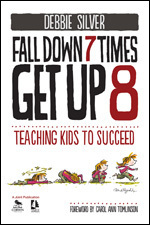Offering praise for inborn talent feeds a fixed mindset that can trigger self-doubt, weaken resolve, and reduce resiliency. In short, it can cripple a student’s ability to learn. Does that mean we should never celebrate God-given gifts?
A fixed mindset says that our abilities arrive with us at birth. We’re given the athletic, intellectual, and artistic talents we’re going to have. Facility with numbers, aptitude with languages, ease with auto mechanics, or whatever the gift—some of us get more than others. Some get less. That’s that. In contrast, a growth mindset suggests that we get our abilities from the effort we put in and from our resilient response to challenge, or what often gets labeled ‘failure.’ Of course we start with different inclinations and advantages, some inborn and some circumstantial. What makes the biggest difference in eventual success, though, is willingness to stick with the hard work of improvement.[1]
If that’s true—and research shows it is—then it also makes good sense to reward students for effort rather than honoring them for talent.
Stanford developmental psychologist Carol Dweck and a team at Columbia University conducted an experiment with 400 fifth graders who each took three tests. After the first test of standard difficulty, two sets of students were praised either for their effort or for their intelligence. A control group received no praise. Researchers made the second test challenging enough that every child failed, and then offered a third test, again of normal difficulty. Stunningly, the students recognized for effort bounced back to improve their scores by 30% over their first performance. On the other hand, the students cited for intelligence saw their scores drop by 20%.[2]
Take a moment to absorb that last statistic: performance by those praised for their intelligence actually decreased by a huge margin! For that group, the failure on the middle test created a crisis in self-definition that then proved debilitating on the third. They had thought themselves capable but the middle-test stumble had “proven” otherwise. The conclusion Dweck and her colleagues came to? We need to reinforce learners for the qualities they can control, like hard work and willingness to get back up after getting knocked down. (Dweck, 2006, 2008)
Feeding a fixed mindset weakens the learning process in a number of ways. Someone who thinks she doesn’t have requisite talent may never jump into new activities and instead will stick solely with what she already knows. Someone rewarded for her inborn ability may start spending more energy preserving the perception of that ability than actually developing it. Such pressure can chip away at a natural love or confidence for the ability itself. Also, according to a fixed mindset, anyone who’s good at something shouldn’t have to work hard at it. In this view, effort actually demonstrates a lack of talent. Ultimately, the learner—even the one blessed with some natural aptitude—short circuits her most crucial pathway to excellence.
Debbie Silver, author of Fall Down 7 Times, Get Up 8: Teaching Kids to Succeed, echoes this sentiment in an online article entitled “Moving Beyond the Myth of Talent”:
 When we praise children for being naturally gifted or talented, aren’t we essentially telling them we value them as being somehow divinely endowed rather than valuing that they make gains through hard-earned achievement? Aren’t we sending the message that natural talent and exceptional ability are what it takes to be successful? Our society is so focused on labeling people as being inherently brilliant, talented, beautiful, and/or physically superior that we have duped ourselves into believing that the most valued assets are those that are effortless.
When we praise children for being naturally gifted or talented, aren’t we essentially telling them we value them as being somehow divinely endowed rather than valuing that they make gains through hard-earned achievement? Aren’t we sending the message that natural talent and exceptional ability are what it takes to be successful? Our society is so focused on labeling people as being inherently brilliant, talented, beautiful, and/or physically superior that we have duped ourselves into believing that the most valued assets are those that are effortless.
This makes natural sense to me: some kinds of praise can prove counterproductive. I’ve seen positive results in both my teaching and coaching by shifting to specific, behavior-centered reinforcement of the learning I’m asking for. I’m on board. Count me in. That said, I’m also not quite ready to give up on all talent-based praise.
Silver argues that singling out natural gifts or talents tells learners we value what’s been ‘divinely endowed’ in place of valuing the gains of ‘hard-earned achievement.’ Even if that’s true, our feedback need not fall into such an ‘either/or’ dichotomy. Perhaps we can build a ‘both/and’ approach. An outsider can name gifts that students, athletes, and children may not even recognize they have. We might see a unique fluidity in their movement or a compelling facility in their expression and wonder what could come of it. Maybe our observation introduces them to a new set of possibilities for their self-expression.
The key, I suppose, besides doing so sparingly, would be to identify and invite the talent without making demands of it. We need to be careful not to turn the gift into an obligation or a burden. Often, we teachers, coaches, and parents want the talent expressed because it will make us look good or make our lives easier. We’re not thinking about the learner’s natural development. We start to apply pressure, expectation, and hopes. And that’s what twists the praise into hesitancy, self-doubt, and resentment. If we stay clean in our observation, not dragging in our own agendas, the praise can activate rather than derail potential.
I also acknowledge that I have questions about my questions. Maybe my last paragraph lets the talented off too easily. Maybe we do actually have an obligation to apply the gifts we’re given to the betterment of the world. I had (and even still have) an unusual gift for mathematical calculation. My ability to process numbers and patterns quickly helped me ace standardized tests, earn national awards, and rack up GPA-lifting grades in high school and college. It also helps me do my taxes and determine tips for waiters with comfortable ease. Have I rebuffed a Creator’s wishes by choosing a field and intellectual passions that let that gift lie dormant? Do I somehow insult those who don’t have the same ability? What a waste, we often hear.
Even if others urge me to expand that particular talent, I might find peace with letting it go. But what about the ‘gifts’ of societal privilege? I was born white, male, able-bodied, and part of an educated family that had access to resources. Such privilege doesn’t make me a better person, but it does give me some advantages. Am I on the hook for making best use of that leg up? Is the obligation from privilege different from one based on talent? Why so? How so? Where does ‘fairness’ to others come in?
At minimum, I say, I need to name the privilege. I’d also argue that we should do the same for talents, whether acknowledging our own or celebrating others’. We can say “I see your aptitude” without implying “You’re more valuable because you have your aptitude”—though, admittedly, many will hear it that way. I might help identify special abilities, but I’ll give particular honor to the effort that my students put into bettering those abilities. We can also encourage them to ask and answer these questions for themselves. That’s where the real learning happens. That’s where potential blossoms into fruition.





[…] rolls, bonuses, and the like usually strive to serve as positive reinforcement. Though they may unwittingly undermine their own cause, many parents and teachers intend praise the same way. In TAGteaching, the “click” […]